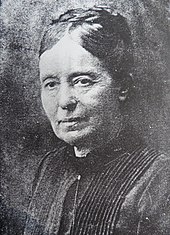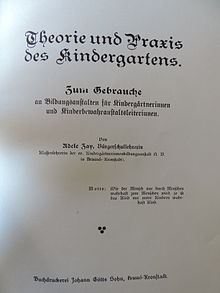Adele Zay
Adele Zay (born February 29, 1848 in Sibiu , † December 29, 1928 in Kronstadt ) was a pedagogue and women's rights activist.

Live and act
Adele was the fourth daughter and the penultimate child of her parents. The father, Daniel Adolf Zay, was an Imperial and Royal Higher Regional Judge in Sibiu. The early death of the father plunged the family into material hardship. Adele Zay's strong will (autodidactically) to train and develop further contributed to the fact that she was already teaching at the age of 17:
- But not only material necessity forced them to rise above the prejudices and the 'calmness' of the women’s world of that time, but even more a hot pursuit of education, whose goal for them at that time was the natural sciences and the Western European languages.
The talented young woman worked as a teacher and educator at various institutions, including an orphanage in Bucharest. There she met Queen Elisabeth of Romania . Then she managed to train as a teacher in Vienna and Szegedin . In the latter city, in 1875, she became a teacher and co-director of a private secondary school for girls, which was linked to a teacher training course. In 1884 the presbytery of the Kronstadt parish asked Adele Zay to take over the leadership of a two-year course for the training of kindergarten teachers. Until 1928 she worked at the Evangelical Kindergarten Training Institute AB , the last five years of which as director. She taught the subjects of German, pedagogy, molding, Hungarian patriotic history, geography, French and practice. The pedagogue set up training courses (initially 4 to 6 weeks, then 2 to 3 months) for specialists who worked in detention centers in the countryside. The training objectives of these courses were:
- the 'main educational principles'
- 'Knowledge of Froebel's underlying principles in bringing up young children today'
- Introduction to games and songs ...
- practical learning of the most important activities and 'gifts' of kindergarten .
In addition to the distribution of language and reading books, she also campaigned for the establishment of Fröbel kindergartens and Froebel pedagogy in Transylvania. Their educational work followed Froebel's educational principles; the Transylvanian-Saxon kindergarten should, no, it simply had to be a Froebel kindergarten ... Zay, 'leading educational ideas' ... coincide, according to his own statements, with those 'educational ideas that ... Froebel have proven to be particularly valuable from the start' and those of the kindergarten give it its peculiar character. According to Zay, a 'mere' custody institution only became a Froebel institution if it applied the games and activities of the master in his sense and thus became an educational and educational institution suitable for children. That went without saying for kindergarten.
In addition, Adele Zay was instrumental in the struggle to enforce the right to vote for women in the Evangelical Church of Transylvania and it is thanks to her driving force that the way for women in Transylvania was cleared for the fulfillment of their duties towards the people as a whole, by giving them rights, the union of women in the German-Saxon women's union, which they sought to shape into a living organism through constant contact, through constant fertilization in word and writing. In addition, their commitment (since 1888) was the training of teachers for elementary schools. Your initiative was successful. In 1903/04 the State Church of Transylvania established the first female teachers' college in Schäßburg .
At the end of the school year 1927/28 Zay retired, but continued to be active:
- In the premonition of her imminent death, she probably had the feeling that she had to hurry her life's work, which seemed far from complete, to its goal ... She wrote essays for the local 'Frauenblatt', polemicized in the 'Landwirtschaftliche Blätter' about the employment of Saxon-denominational parish welfare sisters, sent warnings full of strength and strength to our people and, besides all this, carried out their extensive correspondence with former students and like-minded fellows in all Saxon regions .
After Zay's death
In 1929, the KBA was named after Adele Zay and former students had a memorial plaque attached to the house where they lived and where they died, with the inscription:
- “The memory
- to Adele Zay
- born 1848, died in this house in 1928,
- the teacher and maternal friend
- of the Saxon kindergarten teachers and
- pioneering leader of Saxon women.
- Your grateful students. "
Zay's statements on the woman's situation and tasks were used in 1939 to identify her as a "true National Socialist":
- It was before the great movement in Germany came into view. It can no longer be determined whether she knew anything about her. But in her deepest being she was the spirit of the spirit that saved the German state, the creative power and the dignity of the German people in our mother country!
In 1945 the memorial plaque attached to the KBA had to be removed by order of the Romanian administration. The school was also closed in 1949.
In Drabenderhöhe , the aid association of the Transylvanian Saxons and a kindergarten bear her name. There is a bust of Adele Zay in the foyer of the “Siebenbürgen-Drabenhöhe House, Retirement and Nursing Home”.
Works (selection)
- The woman as a teacher, Kronstadt 1889
- Auxiliary booklet for the training of leaders for summer care institutions, Sibiu 1898
- Hungarian language and reading books for higher elementary and middle schools as well as for the lower grades of middle school, Part I, Hermannstadt 1900
- Magyar language and reading book for community schools. III. Part (3rd and 4th grade school), Sibiu 1903
- Hungarian language and reading books for higher elementary and middle schools as well as for the lower grades of middle school, Part II, Sibiu 1912
- Theory and Practice of Kindergarten. For use at educational institutions for kindergarten teachers and child care facility managers, Brasso-Kronstadt 1916
- The kindergarten teacher training institute of the Evangelical Church AB in Transylvania, Sibiu 1926
literature
- Mandred Berger : Zay, Adele. In: Biographisch-Bibliographisches Kirchenlexikon (BBKL). Volume 40, Bautz, Nordhausen 2019, ISBN 978-3-95948-426-8 , Sp. 1546–1566.
swell
- Martha Heltmann-Capesius (Ed.): For the 50th anniversary of the Adele-Zay School 1834–1934, Kronstadt 1934
- Newborn, Emil: Adele Zay. Life picture of a German woman, Sibiu 1939
- Hans Mieskes : The kindergarten idea in Transylvania. Contribution to the cultural and intellectual history of the Transylvanian Saxons after 1850, Wiesbaden-Auringen 1986
- Ortrun Scola / Annemarie Schiel: Transylvanian-Saxon female figures. Your life and work, undated, undated, pp. 24–26
- Manfred Berger : The Kindergarten from 1840 to the Present, Saarbrücken 2015, p. 36 ff.
Individual evidence
- ↑ In the relevant literature, in addition to Hermannstadt, Kronstadt is also given as the place of birth (cf. Scola / Schiel n.d., p. 24). What speaks in favor of Sibiu is that at the time of her birth her father was the judge of the higher regional judge in Sibiu.
- ↑ Heltmann-Capesius 1934, p. 27
- ↑ cit. n. Mieskes 1986, p. 87
- ↑ Mieskes 1986, pp. 169f
- ↑ Heltmann-Capesius 1934, p. 29
- ↑ Newborn 1939, p. 41 f
- ↑ cit. n. Mieskes 1986, p. 109
- ↑ Newborn 1939, p. 32
- ↑ ibid.
- ^ Aid Association of the Transylvanian Saxons Adele Zay - Drabenderhöhe Online. Accessed April 28, 2020 (German).
- ^ House of Transylvania, residential and nursing home. Retrieved April 28, 2020 .
- ↑ DRK-KITA Adele Zay - The family center in Drabenderhöhe. Retrieved April 28, 2020 .
- ↑ Living memorial for Adele Zay: Supporting association of the Drabenderhöhe nursing home turns 50. Accessed on April 28, 2020 .
Web links
- nifbe - Lower Saxony Institute for Early Childhood Education and Development: Technical articles
- Biographical-Bibliographical Church Lexicon : ZAY, Adele
- Socialnet.de: Zay-Adele
| personal data | |
|---|---|
| SURNAME | Zay, Adele |
| BRIEF DESCRIPTION | Pedagogue and women's rights activist |
| DATE OF BIRTH | February 29, 1848 |
| PLACE OF BIRTH | Sibiu |
| DATE OF DEATH | December 29, 1928 |
| Place of death | Kronstadt |

